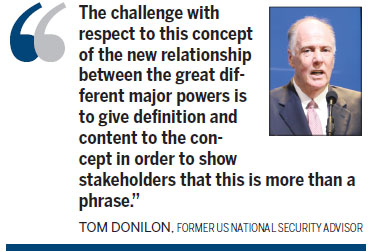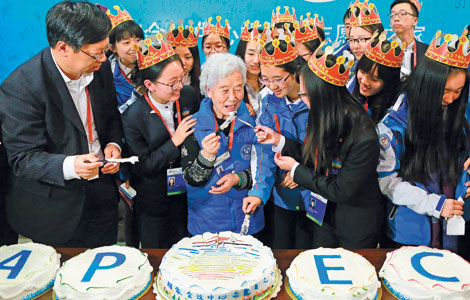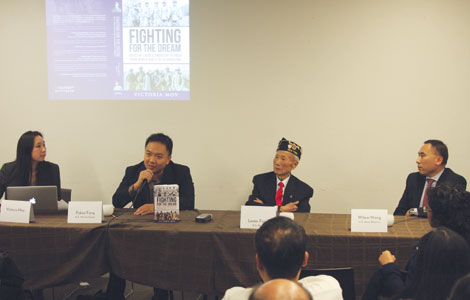New relationship to advance
Updated: 2014-11-06 12:30
By Chen Weihua in Washington(China Daily USA)
|
||||||||
Former US National Security Advisor Tom Donilon said on Wednesday that the upcoming meeting in Beijing between Chinese President Xi Jinping and US President Barack Obama will be the most important bilateral meeting Obama will have this year.
He described it as the most substantial US-China bilateral engagement since the two leaders met in Sunnylands, California in June of last year. Obama is scheduled to go to Beijing for the APEC leaders' summit on Nov 10-11, followed by a one-day visit on Nov 12 to meet with top Chinese leaders.

Donilon, now vice-chair of the law firm O'Melveny & Myers, retired from his White House post on June 30 of last year, but has been active in interpreting Obama's foreign policy, including the policy toward China.
Before a crowd at the Brookings Institution on Wednesday, Donilon described the new model of great power relationship endorsed by the two leaders at Sunnylands as a conscious effort to address and make less likely what some historians see as an inevitable conflict between an existing power and a rising one.
"The challenge with respect to this concept of the new relationship between the great different major powers is to give definition and content to the concept in order to show stakeholders that this is more than a phrase," Donilon said.
Donilon suggested that the two countries should identify concrete, ambitious and mutually beneficial projects that will demonstrate the new model of cooperation is feasible and constructive.
Top on his list is the Bilateral Investment Treaty (BIT), which Donilon said should be concluded next year. Besides the huge interests and economic benefits for both sides, Donilon said it is important to have trade negotiations underway with China at the same time the Trans-Pacific Partnership (TPP) is completed.
Chinese officials and the US business community have been urging the Obama administration to conclude the BIT.
The Obama administration is hoping to conclude the TPP with 11 other nations next year, but major differences, such as opening Japan's agricultural and automotive markets, still persist. There is no guarantee that the Republicans, who now control both houses of the Congress, will let Obama score on such major issues ahead of the 2016 presidential election.
Donilon also listed several other issues as possible areas of extensive cooperation, from energy and climate change to military cooperation and nuclear non-proliferation regarding Iran and North Korea.
He acknowledged that given the complexity of the US-China relationship, areas of competition will persist, noting that the bilateral relationship is least developed in the strategic area, such as in strategic military doctrine, nuclear issues, space and cyber.
"These issues have a great impact and have the potential to disrupt US-China relations," he said.
In a briefing with Chinese journalists on Wednesday, Chinese Ambassador to the US Cui Tiankai described the past conflicts between a rising power and the existing power as both wanting to fight for hegemony, thereby making the conflict inevitable.
"But China's development is not to fight for hegemony with others. China's intention and goal is to develop itself and excel itself, rather than challenging others and conquering others," he said.
Cui believes that it will remain true that with the growing common interests between the two countries, many differences will also continue to exist.
SEE "ties" PAGE 2
He described the consensus reached last year between Xi and Obama to build a new type of major country relationship between the two countries as an acknowledgement of the many differences, including some difficult and long-standing ones.
"Exactly because of these differences, we will need a framework for the new type of major country relationship more," he said.
Cui said it's impossible for problems to disappear overnight, but added, "We will not allow the problems and differences existing between our two countries to topple the overall bilateral relationship."
Cheng Li, director of the John L. Thornton China Center at the Brookings Institution, believes economic globalization, regional economic cooperation and integration should be among the top priorities of Obama's talk with Xi to make sure that it's not mutually exclusive under any arrangement.
Many Chinese were disappointed that the US has shown no support for the BRICs Bank and Asia Infrastructure Investment Bank (AIIB) which China has been actively involved in. The US is said to have put pressure on Australia and South Korea not to participate in the AIIB. China's plan to push forward the Free Trade Area for Asia Pacific has also been stalked by the US.
Meanwhile, the TPP led by the US and being negotiated among 12 countries does not include China.
"I believe the two countries could reduce their differences through a mechanism of dialogue rather than excluding the other," Li said.
chenweihua@chinadailyusa.com
Most Viewed
Editor's Picks

|

|

|

|

|

|
Today's Top News
Mexico cancels Chinese bullet train deal
China's wealthy look to make 'social impact' on education
Airline exec sees bright side for China and US
China, US must lead on climate: experts
China's coal solution could be in steam
Asian Americans supported Democrats in elections
Is Xiaomi ready for Western markets?
France to assist hunt for corrupt officials
US Weekly

|

|
















